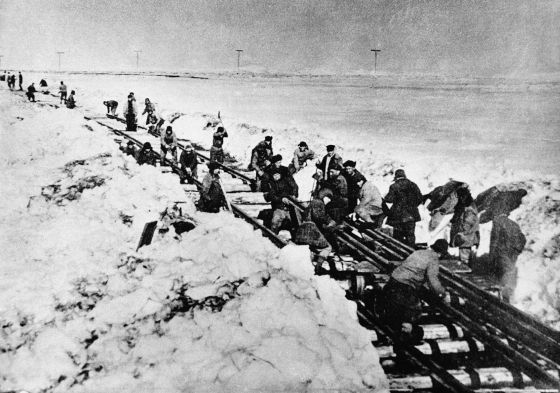Aleksandr Solzhenitsyn
Pages 134-167
Literary Analysis
A Tale of Dark Humour and Bread
One Day in the Life of Ivan Denisovich is an exquisitely written novel by Aleksandr Solzhenitsyn. The book's main goal is to allow the reader to immerse themselves into a Stalinist work camp during the 1940s and spend an entire day there. As one easily learns after reading the piece, the convicts at these camps worked in horrid conditions in extreme weather. They are also daily victims of extreme hunger, fatigue and have no trouble whatsoever falling ill - which Solzhenitsyn brilliantly describes through the use of several literary techniques and by flawlessly exploring certain themes.
Convicts from a Stalinist gulag working on a railroad
The most highlighted theme throughout the novel is undoubtedly the undying hunger. Solzhenitsyn doesn't hesitate to describe how our protagonist, Shukov's, belly "is an ungrateful wretch, it never remembers past favors, it always wants more tomorrow" (Solzhenitsyn 165). Not to mention that there are constant mentions of the extra loaf of bread Shukov carried around with him and how hard he worked to hide it by sowing hidden patches in his clothes, hiding it in his mittens, etc. Following, the author also writes about how our protagonist had a reasonably lucky day, due to the fact that his group got dinner first and quickly and that a fellow inmate gave him an extra loaf of bread as a thank you. Evidently, hunger was indeed a theme in which Solzhenitsyn decided to explore deeply.
A loaf of bread
Another theme one can notice as they read is humor or irony. Life in a Stalinist gulag was irrefutably miserable, filled with perilous tasks, an undying hunger and a feeling of vast emptiness. However, as once can see in the passages "104, form up in fives," Pavlo shouted down at them. "And you make way there, friends!" and "The friends would be hanged first." (Solzhenitsyn 97). Throughout the novel, there are no mentions of our protagonist having any friends, merely of previous conflicts with other inmates. That is why, the mention of 'friends' can be considered some kind of a dark humour, since they are merely convicts with the same amount of luck anyone else has, in a place where nearly every character is either freezing, starving, sleep depreived, etc.
Concluding, these, while they are far from being the only themes present in Solzhenitsyn's controversial piece, are some of the ones which stood out the most. Without the hunger being so vastly explored and so dramatically described, the reader would not have believed that life in the gulag was so miserable and without Shukov's dark humour, we would be stuck with a protagonist that either a) never ceased to complain or b) never said a word.



No comments:
Post a Comment